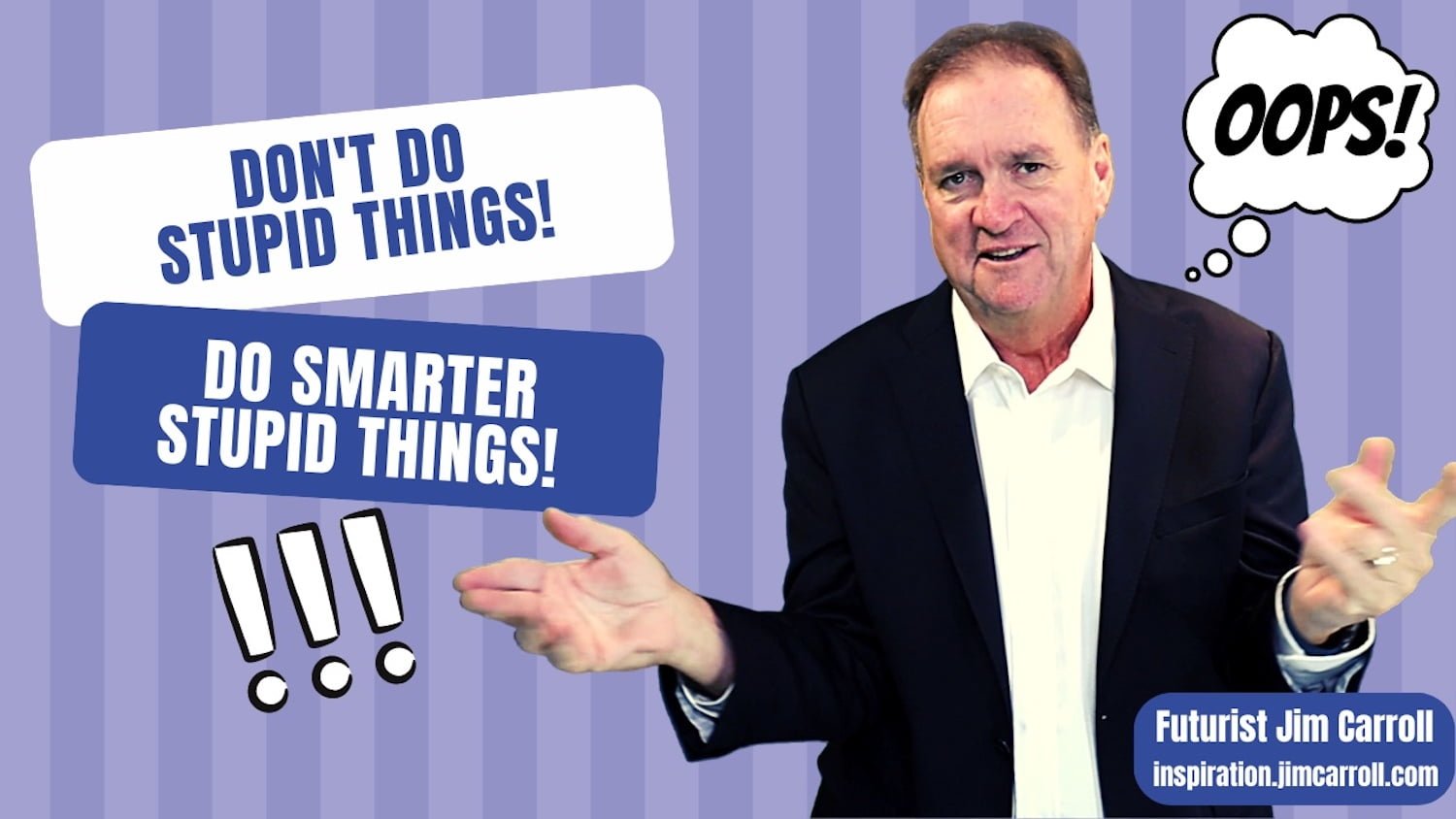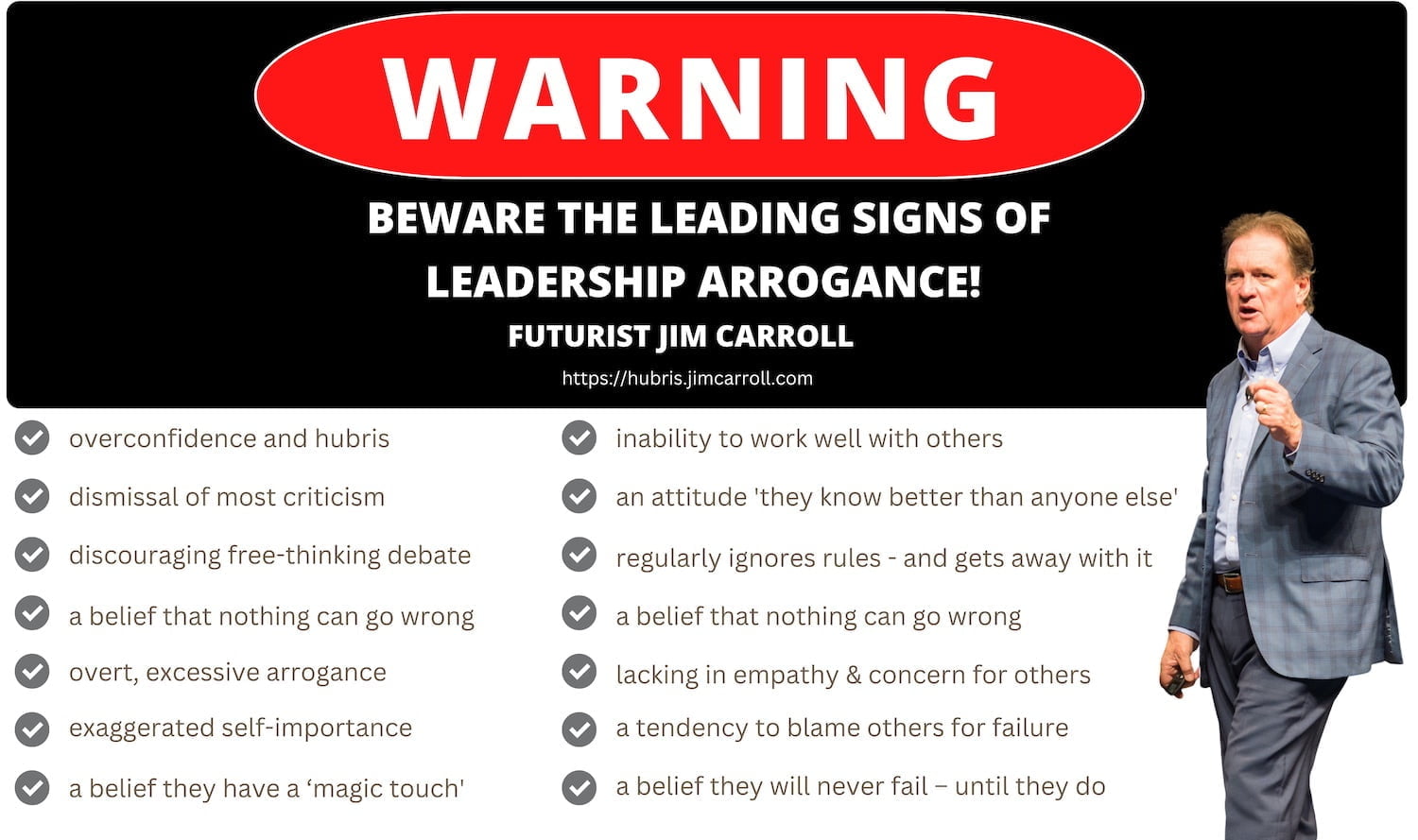“Don’t do stupid things. Do smarter stupid things!” – Futurist Jim Carroll

Here’s the shorter, inspirational, more action-oriented version: “Make smarter stupid mistakes!”

What’s this about? I need to give you a warning sign!

Read this list and see if you can guess who I’m referring to with all this stuff!

Yup, it’s an Elon Musk post! I wrote about the situation in last week’s post, Understanding Hubris: What Drives CEO Arrogance – and Why Does it Never End Well?
Understanding Hubris: What Drives CEO Arrogance – and Why Does it Never End Well?
What is happening today at Twitter is a stunning display of arrogance and hubris in action, and those of us who were once fans of Elon Musk suspect it will not end well. Also, we’ve moved pretty quickly from being a fan to watching in stunned silence. (Not a fan!)
Here’s the context: tech firms have long subscribed to the mantra “Move fast. Break things.” It’s been a key part of the culture of success – you can only accomplish big things if you are willing to innovate quickly by taking on greater risks. That’s smart innovation – sometimes it works. But, you must wonder when smart innovation transitions into stupid innovation. I think that is what happening right now with Musk, and that’s the context for today’s quote.
My post on CEO arrogance and hubris took months for me to pull together; I actually began working on it about six months ago when this situation first started to unfold. I used my online research service to pull out hundreds of articles on the topic going back to the 1980s, and spent a lot of time reading through them, discovering nuggets like this on the ‘Icarus Syndrome.’
In organisations, the Icarus syndrome characterises leaders who initiate overly ambitious projects that come to naught, causing harm to themselves and others in the process. Fuelled by excitement, these leaders are unable to rein in their misguided enthusiasm before it is too late. Often, these leaders have let adulation go to their heads. They display symptoms such as:
- Placing excessive confidence in their own judgment
- Harbouring feelings of omnipotence
- Becoming reckless and restless
- Displaying contempt for the advice and criticism of others
- Ignoring the practicality, cost or damaging consequences of their various endeavours.
Insead Knowledge, 01 Jul 2019
Sounds like someone in the news today. I scribbled notes to myself, studied the research reports, and compiled a long list of the attributes of CEO hubris that led to corporate failure. Go read the post – and look at the list. Now compare it to what’s happening today.
Today, speed accelerates all change. Years ago, when speaking on stage at the global conference for Burger King, I noted that a brand today can ‘go from hero to zero in a matter of months.’ That was back in 2009 when social media was quite new, and brands were trying to understand this complicated new world. Today, given the fierce backlash against Musk by people who are *not* fans, it’s pretty evident that a CEO brand can go from hero to zero in a matter of weeks. In my post last week, I wrote:
And now, it happens faster. You can watch CEO arrogance happen live, in real-time – you are probably doing that right now. Think about it – in the olden days, like, 10-20 years ago, it took years, if not decades, to watch organizations like Sears, Kodak, Blockbuster, and Nokia implode. Now, with Twitter, Facebook, and other tech firms, you can watch it happen before your very eyes – at blinding speed!
And so yesterday, many of us were watching in real-time. Consider what happened as seen in a series of images: First, he reported that he was going to take on a project of doing something that, well, you don’t normally just do with code.

Later in the day, many people were reporting problems with a certain feature – specifically, 2FA (or Two-Factor Authentication) which is the service that will send you a text message code when you log in to verify that it is really you. It stopped working.

People were soon reporting far and wide on the problem – and solution. (Don’t do anything that requires you to use the feature!)

and suggested solutions:

Anyone with half a brain will tell you that when it comes to an extremely complicated service with an extremely complicated software ‘stack,’ you don’t just start removing things on a whim. But, well, hubris and arrogance. (If you want to learn more about what happened, Wired has a great article: “Twitter’s SMS Two-Factor Authentication Is Melting Down: Problems with the important security feature may be some of the first signs that Elon Musk’s social network is fraying at the edges.”)
As with any business icon, there are many Elon Musk fans – I once counted myself among them. He has done remarkable things – reinventing and setting the pace with the automotive industry with Tesla, accomplishing astonishing things with the industry of space with Space-X, and accelerating the concept of civic infrastructure with the Boring Company. But as with many, I’m not a fan of reckless idiocy driven by hubris. Read the post I wrote on CEO hubris, and see if it fits. Every single warning sign is there.

Which makes one wonder. Yesterday, folks were sharing how Forbes Magazine, like many, often gets caught up in the hype and myth of the billionaire superstar, with the current crypto meltdown of Sam Bankman-Fried’ (“SBF”) joining the distinguished company of Elizabeth Holmes of Theranos. (Both are likely to end up in jail for fraud driven by, well, hubris.)

Some now wonder about other magazine covers.

CEO hubris is a dangerous thing.
And, there is smart stupid innovation. And then, there is stupid stupid innovation.
Know the difference.




GET IN TOUCH
Jim's Facebook page
You'll find Jim's latest videos on Youtube
Mastodon. What's on Jim's mind? Check his feed!
LinkedIn - reach out to Jim for a professional connection!
Flickr! Get inspired! A massive archive of all of Jim's daily inspirational quotes!
Instagram - the home for Jim's motivational mind!